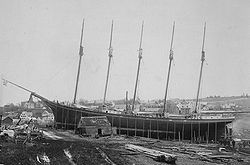Waldoboro, Maine
| Waldoboro | |
|---|---|
| Town | |

Preparing schooner Governor Ames for launch, 1888
|
|
| Motto: "Home of the Five Masted Schooner" | |
 Location in Lincoln County and the state of Maine. |
|
| Coordinates: 44°6′5″N 69°23′23″W / 44.10139°N 69.38972°WCoordinates: 44°6′5″N 69°23′23″W / 44.10139°N 69.38972°W | |
| Country | United States |
| State | Maine |
| County | Lincoln |
| Incorporated | June 29, 1773 |
| Area | |
| • Total | 78.86 sq mi (204.25 km2) |
| • Land | 71.50 sq mi (185.18 km2) |
| • Water | 7.36 sq mi (19.06 km2) |
| Population (2010) | |
| • Total | 5,075 |
| • Estimate (2012) | 5,027 |
| • Density | 71.0/sq mi (27.4/km2) |
| Time zone | Eastern (EST) (UTC-5) |
| • Summer (DST) | EDT (UTC-4) |
| Website | http://www.waldoboromaine.org/ |
Waldoboro is a town in Lincoln County, Maine, in the United States. The population was 5,075 at the 2010 census. Waldoboro is a fishing town.
In 1629 the area that would become Waldoboro was granted to John Beauchamp of London and Thomas Leverett of Boston, England and was known as the Muscongus Patent. The patent lay dormant until 1719 when Leverett’s great-grandson, John Leverett, President of Harvard College, revived the ancient claim and formed the Lincolnshire Proprietors, also known as the Ten Proprietors, so named for the ten shares distributed, one to each member. General Samuel Waldo of Boston acquired a controlling interest in the patent in 1729 and it henceforward become known as the Waldo Patent.
First called Broad Bay, the village was settled between 1733 and 1740, but suffered a devastating attack as part of the Northeast Coast Campaign (1746) by Native Americans allied with New France during King George's War. Houses were burned and inhabitants killed or carried away as captives. Survivors fled to the nearby settlements of St. George or Pemaquid. Peace returned with the 1748 Treaty of Aix-la-Chapelle.
In 1752–1753, Samuel Waldo, son of the general Jonathan Waldo, visited Germany and recruited about 1,500 immigrants to Waldoboro on the ship Lydia. Some were followers of Martin Luther and Huldrych Zwingli but they did not immigrate for religious reasons like the Pilgrims but for "...increasing their worldly goods.", most from the Rhineland. Waldo hired Sebastian Zouberbuhler as an agent. Many settled on the western side of Broad Bay, although in 1763–1764 the land was claimed under the Pemaquid Patent. About 300 residents moved to the Moravian settlements in what is now Forsyth County, North Carolina, but the remainder bought their properties. On June 29, 1773, the township was incorporated as Waldoborough, named for the original proprietor.
...
Wikipedia
